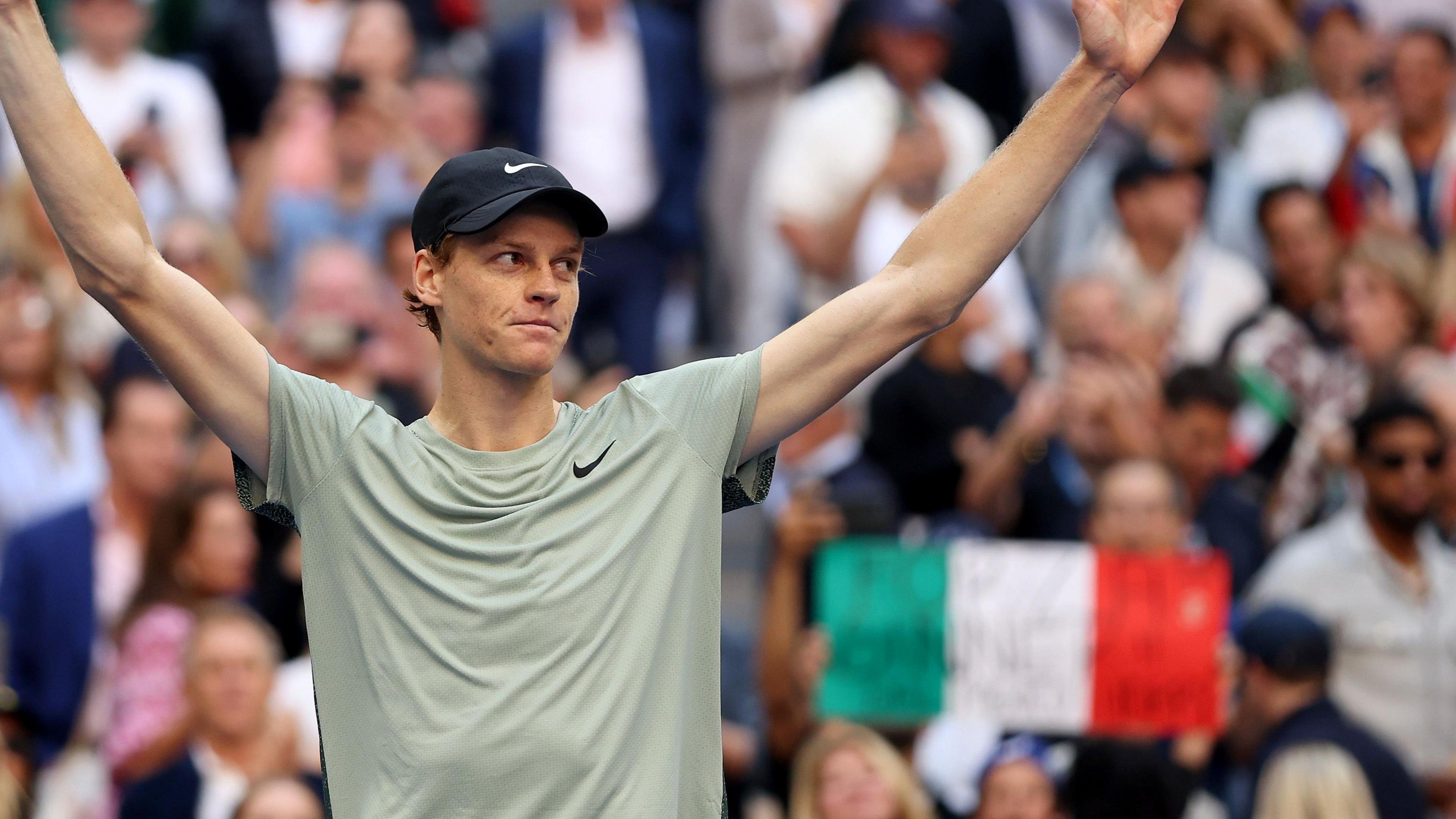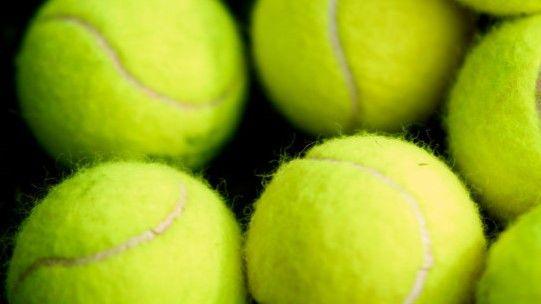Will cloud hang over Sinner's US Open victory?

Jannik Sinner remained bashful and rather reserved after clinching the US Open title
- Published
Jannik Sinner is not known as one of the most expressive characters on the tennis scene.
Even so, the Italian world number one's more subdued demeanour was glaringly obvious during his march to the US Open title.
Reserved celebrations and increased mindfulness were the result of Sinner being embroiled in a doping controversy that shook the tennis world to the core.
In the week leading up to the final Grand Slam tournament of the season in New York, it was revealed Sinner had twice failed anti-doping tests earlier this year.
Sinner, 23, was found to have low levels of clostebol - a banned anabolic steroid - but was found to have no fault or negligence by an independent tribunal.
"Obviously it was very difficult for me to enjoy in certain moments," Sinner said after beating Taylor Fritz to win the US Open on Sunday.
"Also how I behaved or how I walked on the court in certain tournaments before, it was not the same as I used to be, so whoever knows me better, they know that something was wrong."
Over the course of the past two weeks, he has attempted to put the topic in the background. The rocky start has been transformed into a triumphant finish.
Yet the case has thrown up lots of debate and a host of questions have not gone away.
The World-Anti Doping Agency (Wada) has subsequently launched an appeal against the decision to clear Sinner of blame.
The body announced the decision 20 days after Sinner's US Open triumph, saying the ruling by the independent tribunal was "not correct under the applicable rules".
Sinner's second Grand Slam victory will - for many people - continue to have a heavy cloud hanging over it.
Reputational damage is not easy to shake off.
British doubles player Tara Moore, also found to have no fault or negligence in a doping case, described the "trickling away" of her reputation in the 19 months she was not allowed to play while fighting to clear her name.
Similarly, British athlete Paula Radcliffe and Australian swimmer Ian Thorpe - superstar names in their fields - felt they had been "tarnished" by wrongly being accused of doping in huge stories of their time.
Although Sinner was cleared of wrongdoing, he will never be free of the suspicion and scepticism which remain in some quarters.
"As with any player who tests positive, there is going to be a cloud and some doubt over them for the rest of their career," said investigative journalist Edmund Willison, whose Honest Sport website, external specialises in sports doping stories.
"Certainly it will always be in the rear window."
Sinner savours US Open win after 'difficult' build-up
- Published9 September 2024
Is tennis catching doping cheats or ruining careers?
- Published8 May 2024
Locker room concerns remain over Sinner case
The way in which Sinner's case was handled has led to accusations that the world number one received special treatment.
Questions were raised about the speed of the resolution, why Sinner avoided a provisional ban and how the case was kept under wraps.
When the news broke, there was a backlash from several of Sinner's peers on the ATP Tour who felt he had been treated differently.
A provisional ban was applied after each failed test.
As entitled under the rules, he escaped suspension because he successfully appealed against the decision by providing what the International Tennis Integrity Agency (ITIA) deemed a "credible explanation".
Sinner, who claimed £2.75m for winning the US Open and has money-spinning sponsorship deals with Nike and Gucci, has the benefit of being able to afford specialist legal representation - unlike many other players in similar situations.
The ability of Sinner and his team to react quickly, appealing on the same day they were informed of the failed tests, is what enabled him to carry on playing.
Australian former Wimbledon finalist Nick Kyrgios - himself a polarising figure - has continued to be a leading critic, while Britain's Liam Broady said he found himself "wondering about a lot of the things" in Sinner's story.
At a meeting of the ATP Tour's player advisory council in New York, locker room representatives used the opportunity to "discuss the role of the ITIA" in the case.
There have also been calls for greater "consistency" from both Novak Djokovic and Roger Federer in the way every case - regardless of a player's ranking or wealth - is dealt with.
Suggestions that Sinner was treated differently to others is strongly refuted by the ITIA.
"All anti-doping cases are different, but the process is always consistent, and this case was dealt with according to the facts, not the player's ranking," an ITIA spokesperson told BBC Sport.
The ITIA was satisfied with the explanation which was given quickly by Sinner and his team, and the agency's scientific experts were also happy it was plausible.
"There is independent expert analysis throughout any anti-doping process and the decision is taken by an independent tribunal [from outside the sport]," added the ITIA.
"We are comfortable that this was dealt with according to the rules."
Sinner part of Italian sport's 'clostebol crisis'
As the world's leading men's player and one of the faces on which tennis pins its hopes of driving interest in its post-superstar world, Sinner becoming the centre of a doping controversy was not a good look.
The 23-year-old twice tested positive in March for clostebol - a steroid that can be used to build muscle mass and enhance athletic performance.
An investigation by the ITIA found Sinner had been inadvertently contaminated with the anabolic steroid by physiotherapist Giacomo Naldi.
Clostebol is an active ingredient in dermatological cream or spray called Trofodermin, which is used to treat skin abrasions, cuts and wounds and is readily available over the counter in Italy.
Sinner and his team successfully argued Naldi had been applying Trofodermin - given to him by Sinner's fitness trainer Umberto Ferrara, who is a qualified pharmacist - to a cut on his own hand, then carried out treatments on the player.
"In my mind I know I haven't done anything wrong," Sinner said in his pre-US Open news conference.
According to Italian law, the packaging on Trofodermin must have a visible symbol indicating the presence of a substance included in the Wada list of prohibited substances.
Despite the warnings, several Italian athletes - across tennis, football and athletics - have still tested positive for clostebol in recent years.
Sinner, who praised the professionalism of Naldi and Ferrera before announcing he was no longer "confident" working with them because of their "mistakes", was the fifth Italian tennis player to have clostebol found in his system.
While clostebol alone is not believed to have a huge effect on a player, Willison fears in general that it could be an indicator of a deeper, more sophisticated programme.
"Italy has quite clearly been in the midst of a clostebol crisis, of some form or another, for much of the past decade. A decade in which clostebol detection methods have become more sensitive," Willison, who wrote an in-depth piece on the subject,, external told BBC Sport.
"Every case has to be treated individually, of course.
"But in the reasoned decision in Sinner's case it does not explicitly refer to the four other clostebol cases in Italian tennis, and I believe that provides important context."
Related topics
- Published16 August

